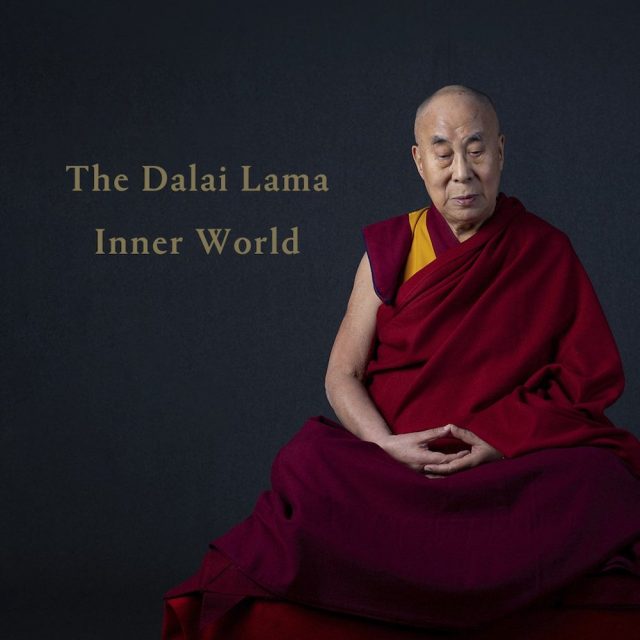There are countless meditative and devotional releases doing the rounds in 2020. But there are few albums that actually help do what they are advertised to do. The two that spring to mind are Lou Reed’s ‘Hudson River Meditation’ and the Beastie Boys’ ‘Bodhisattva Vow’. The first was created as a soundtrack to Reed’s Tai chi, while the ‘Bodhisattva Vow’ was efficiently Adam ‘MCA’ Yauch coming to terms with his new Buddhist spirituality.
The Dalai Lama’s debut album ‘Inner World’ sits somewhere between both of these. It is an album that can be played either when meditating or during times of inner reflection, and it also works as an introduction to the beliefs of the Tibetan Buddhists.
This is demonstrated on the first track ‘One Of My Favourite Prayers’. The album opens with traditional Tibetan wind instruments. The breathy, swirling, notes conjure up the images of snow blowing through mountain ranges. As the sounds intensify, a gently strummed guitar underpins it.
Then we hear the voice of the Dalai Lama who tells us about his favourite prayer. After he recites the mantra “For as long as space endures / And for as long as living beings remain, until then may I too abide / To dispel the misery of the world…” the music continues on its ethereal swirling patterns before the Dalai Lama repeats the mantra again and again before the song gently fades out. ‘One Of My Favourite Prayers’ tells you exactly what is to follow: this will be an album of relaxing music which a deep spiritual message told in a very simple way.
‘Inner World’ first began after Junelle Kunin, a long-time student of the Dalai Lama, wrote to him explaining that if they made an album is would help countless people who struggle with emotional stress. The Dalai Lama responded, “This will benefit many people!” and so the project began. The music was composed by Kunin and her husband Abraham Kunin, who performs the majority of the parts on the album.
‘Compassion’ is another track that really resonates. On it the Dalai Lama talks about how it is through our mothers that we learn compassion as they are the first people we properly interact with. If they are kind and caring, then we will develop in to kind and caring people.
‘Ama La’ features Anoushka Shankar on sitar. Abraham Kunin allows Shankar’s playing to come to the fore, without interfering with the Dalia Lama’s message of compassion. Her inclusion really elevates the music and is one of the standout moments on the album.
When I first started thinking about how I was going to review this album I came to a blank. Tibetan Buddhists believe in karma. How every action has a reaction. These reactions might not be felt immediately, but they will be felt. They believe that doing good deeds gives rise to positivity and this positivity will affect the life of the doer. If I wrote something negative about ‘Inner World’ then it might have a negative impact on my life and the lives of the people involved with this album. But if I didn’t trust my gut about the album then that would also bring on a series of bad karma.
Luckily, the truth is that ‘Inner World’ is an incredibly enjoyable album. There are parts to it that don’t work as well as they might, the instrumentation feels slightly cliché at times, rather than embracing the rich Tibetan music tradition for Western ‘devotional’ synths, but overall it is a very rewarding album that is easy to get lost in.
At its heart ‘Inner World’ offers insights on how to be a better person. It discusses issues of compassion, wisdom, and humanity. While the Dalai Lama’s tone is friendly, as you’d expect. He isn’t trying to force you to join his way of thinking, only giving you ideas of how to try and live your life in a more thoughtful and compassionate way.
The main problem with ‘Inner World’ – for this writer, at least – is that is doesn’t feature enough traditional Tibetan music. Initially I thought that the album would be filled with hypnotic Tibetan chants and drones, similar to Angus MacLise’s recordings from the late 1960s, but this isn’t the case. Each track has elements of this wonderful music, but they are incorporated to the Western backing music. Only on ‘Humanity’ is there a prolonged section of chanting. It sounds incredible and is a shame that there weren’t a couple of tracks just devoted to that.
Another downside is that we don’t hear the Dalia Lama’s infectious laugh. Of course, this is a serious album and laughter might have devalued the over theme, but he but is a self-confessed ‘professional laugher’ so an inclusion might have been nice touch. Of course, these are minimal issues with an album that is overflowing with compassion and human kindness.
8/10
Words: Nick Roseblade
– – –
– – –

